After Garbo's great success in Lubitsch's sublime satire "Ninotcka," MGM's Eddie Mannix proposed a new picture for her to start shooting on September 1. But WWII broke out and the closing of the European market, where she was always most popular, made another picture with her risky, especially at her high salary.
Bennie Thau was delegated to ask Garbo if she would do two pictures for the price of one. As always, Garbo took her time (she was always too slow in making decisions) and after two weeks replied that she wouldn't make that concession, but would do one picture for $150,000. Thau then asked if she would do two for $300,000. She said no, just the one, Two-Faced Woman, to be helmed by George Cukor, who was responsible for what's considered to be Garbo's great screen performance, "Camille" (1937).
The story was slight. Larry Blake (Melvyn Douglas), the publisher of a news magazine, goes to a ski resort on vacation, where he meets and marries Karin (Garbo), a ski instructress. He promises her to give up his sophisticated New York life, and returns to the city alone. Meanwhile, ex-flame Griselda Vaughn (Constance Bennett) plots to get him back. Unbeknownst to anyone, Karin arrives in New York and realizes that she can't compete with the glamorous Griselda. To combat Griselda, she impersonates her own twin, a world-wise woman. Larry realizes it is really Karin and tries to get her to expose herself. When he makes love to her, she realizes her plans have backfired. She returns to the ski resort. Larry follows her and proves that he was on to her disguise. They reconcile.
In "Two-Faced Woman," Garbo's 27th and final film, she appeared opposite Melvin Douglas for the third time in this second of her comedies. In her first undraped publicity still released since 1929, Garbo revealed her "boyish physique" in a swimming pool scene. Indeed, the MGM publicity machine tried to make the most of Garbo's new facts: "Not only does Garbo laugh, but playing the dual role of twins, she sheds her clothes, swims, wears a new and feminine hairdo, dances a brand new Rumba, skis, and wrestles with a man.
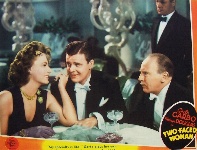
Censorship Problems
|
From the start, "Two-Faced Woman" encountered problems with the censors. In its condemnation of the comedy, the Legion of Decency listed as its reasons "immoral and un-Christian attitude toward marriage and its obligations; suggestive scenes, dialogues, situations and costumes." To appease the Legion a senseless scene was inserted, one that destroyed whatever comic point the film might have had.
The original story idea was told verbally by MGM's Hyman, and immediately rejected by PCA's Joseph Breen. The reason for the rejection: "The story contemplated the situation of a man having a sex affair with a woman whom he thought was his wife's twin sister, getting her pregnant, and then discovering that it was his wife whom he had impregnated!
The script kept coming in sections, and without an ending. The censors never knew how the story was going to end, until sometimes after the first part had actually been shot. They read and reported on 23 sections of script, including retakes. The picture was first submitted for review on August 28, 1941 and the Code approved it, with the elimination of one line.
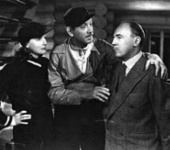
But then they were informed that there would be considerable retakes. The Code read the retakes on September 11, and was happy to report that they meet its requirement. They rereviewed the picture again on October 3, and again found it satisfactory. A certificate was issued on October 6.
On August 7, the Code found Karin's line, "I have no past before last night," questionable, because it takes place the morning after their reunion, which may give it a decidedly suggestive flavor. Would it be possible to rephrase it as, "I have no past before this morning," and thus avoid the danger of giving offense."
In July, there were several objections. Williams's speech: "I'm not after her--I've got her!" and Griselda's exit line, "Who hasn't?" were deemed offensively sex suggestive because of the double entendre, and needed to be changed. Another word, such as caught, would be more acceptable. They also didn't like the following overly sex suggestive dialogue: "To what is in our minds. I'll drink to what's in my mind. How do I know what's in yours?" They suggested replacing the word mind with the word heart.
On June 17, Breen wrote to MGM's Louis B. Mayer: "Due to the fact that this script is coming in in segments, it is very difficult to render any kind of an intelligent opinion as to the final acceptability of the various sequences. Such an opinion will probably have to wait until we can judge them in reference to the finished picture. The drinking must be kept down to a minimum, and at no time must Karin become offensively drunk. In this connection, we have in mind the numerous protests and complaints we have received in connection with your company's previous picture, ?The Philadelphia Story.' We would not be able to approve another scene of drunkenness on the part of the leading woman, such as occurred in that picture."
On June 13, l941, the PCA received the first 84 pages of the incomplete script. Objections were made to several segments of the dialogue. "The dialogue must be delivered without sex suggestive inference. Otherwise we will not be able to approve the scene in the finished picture: "How could a thing like that happen? We got snowed in. If you got snowed in with Karin, I think you'd be married too."
The PCA suggested omitting the opening scene in which Blake is taking a shower, with all the business of him giving her the pajamas, as tending to give a sex flavor to the whole scene. Please avoid sex suggestiveness in the lines "I have a feeling that it's awfully late.' Also, throughout this scene, please see that both Karin and Blake have dressing gown and negligee over their pajamas. The embrace on the bed is very questionable. We recommend that you consider this action so they are both out of the bed at this point. The embrace must not be with either of them in a horizontal position, nor must it contain any sex implications."
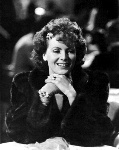
In a December 5 telegram, J. L. Westhaver begged the Hays office: "Please do not cut Two-Faced Woman.' Pictures have been so cleaned up that they are becoming uninteresting. There are groups who would remove all the spice of life and make this world a very drab place to live." Finally, on December 17, the National legion of Decency reviewed the revised version and voted to lift it from the C or Condemned list. The studio announced its intention to withdraw the original version and substitute all future bookings with the new version.
The Production Code administration claimed that "Two-Faced" Woman was a story about the preservation of a marriage, and that it "fails to see anything immoral or unchristian in the picture's attitude toward marriage. The marriage was entered into as a permanent institution. The wife came to recognize the proper relationship between a husband and wife, and went back to him. In conclusion, the wife came to recognize that her duty was by the side of her husband
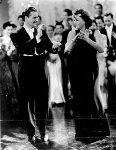
Negative Reviews
|
The reviews were and scathing, and in hindsight too scathing, describing the film as a "wretched comedy and dismal experience." The New York Times stated: "This is clearly one of the less propitious assignments of her career. Though she is her cool and immaculate self in the role of the clean-limbed ski instructress, she is as gauche and stilted as the script when playing the lady of profane love. No doubt her obvious posturing, her appallingly unflattering clothes and make up were intended as a satire on the vamps of history; instead, her performance misses the satire and looks like something straight out of the movies of 1922.
Melvyn Douglas, who probably spends more time in pyjamas than than any male lead in history, looked as though a brisk walk in the open air in street clothes would refresh him. Apply that rule to the whole film. Open the windows, Messrs. Cukor, Behrman, Oppenheimer, et. al. This is 1942, and Theda Bara's golden age is gone."
Time critics though that "Two-faced Woman" was an absurd vehicle for Garbo: " Its embarrassing effect is not unlike Sarah Bernhardt awatted with a bladder. It is almost as shocking as seeing your mother drunk." Cecilia Ager of PM was even more critical. She wrote: "The screen doesn't have an actress to compare with Garbo for loveliness, sensitivity, incandescence. She has feeling first, and she's acquired the technical proficiency and the knack of timing with which to express it. She reveals still deeper stores of humor and evanescent tenderness than even before. Her voice has become an instrument that indicates all the emotions in their most subtle gradations."
"This is the woman, so unique in the movies that she's no longer a person but become now a symbol, a legend, whom "Two-Faced Woman" does everything it can to destroy. The wickedness in Two was not in its careless disregard of what are supposed to be the public morals--it had no more contempt for the conventions than a half-dozen recent movies for whose transgressions it was made an example of--its wickedness lies in its vandalism. In its story's frenzy to cover up its emptiness, its sterility, its lack of any fine feelings, it makes Garbo a clown, a buffoon, a monkey on a stick. The fact that it's comedy doesn't excuse its confused motivation, its repetition, its distasteful heartlessness."
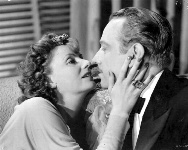
Why Garbo Quit?
|
Throughout her career, there were speculations about: Why Garbo remained aloof? Why Garbo was never married? Above all, why did Garbo quit the screen so young?
The title, "Two-Faced Woman," did not do justice to Garbo's generosity. In the past, she had been stubborn and uncompromising where her career was concerned. Hoping to make Garbo more popular with American audiences, she was forced to take a foolish part, unsuited to her talent.
"This is just frothy entertainment, light all the way through," Cukor said at the time. "We tried to make it gay and funny." In later years, Cukor said he regretted asking Garbo to take such a light comedy part, confiding: "I'm still not sure whether or not I was responsible for the complete lack of success of this film."
For Cukor, Two-Faced Woman" was and continued to be a "disastrous" film. Hence, he was baffled when the film became popular in Garbo's retrospectives and film festivals. As in the case of "Sylvia Scarlett," Cukor couldn't understand "what they like in the picture."
Some said that, "Garbo's had it," that the medium had gotten "too baffling" for her. Others claimed that Garbo's career came to an end because, with the loss of her European audience, MGM decided to change her presence into the persona of the all-American comedienne, but the mask didn't suit her. For his part, Cukor held that Garbo quit because she was disappointed with MGM, which had made her promises that they clearly were not going to keep.
In all likelihood, these mysteries would outlive the interest in them. Nonetheless, what really matters is the rich body of work that Garbo had left behind her. That stays forever and we should be grateful! |